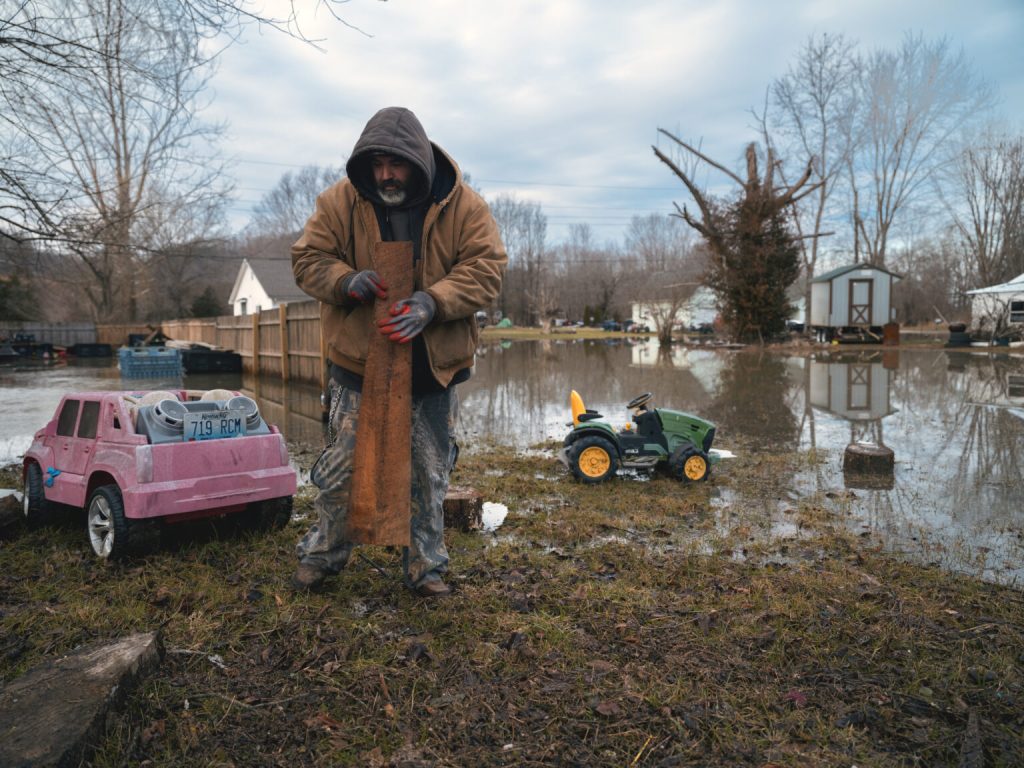With lawmakers’ ‘contradiction’ on virtual school, Beshear lets calamity days bill become law
Published 2:07 pm Wednesday, March 26, 2025

- Jacob Meyers gathers debris in his flooded yard in Athertonville, Kentucky on Monday, Feb. 17, 2025. (Austin Anthony for the Kentucky Lantern)
|
Getting your Trinity Audio player ready...
|
From Kentucky Lantern
By McKenna Horsley
Democratic Gov. Andy Beshear decided to let a bill become law that not only allows Kentucky schools to make up days lost to bad winter weather and floods, but also protects a controversial online school from enrollment caps imposed by state education officials.
Beshear allowed House Bill 241 to become law without his signature. The bill’s passage in the General Assembly was in doubt for a time after the Senate added a provision to protect the Kentucky Virtual Academy’ after the Kentucky Department of Education sought to curb its enrollment due to poor student performance and failure to meet staffing requirements.
The bill was introduced to provide relief to Kentucky school districts running out of their 10 NTI days, or non-traditional instruction days, this school year. Even before Kentucky was hit with widespread floods in mid-February, some schools had closed and temporarily moved to virtual instruction due to bad winter weather or sickness.
Leading up to the veto period, a free conference committee made up of House and Senate members reached an agreement on the bill that allows public schools to waive five required days and make up for lost instruction by lengthening the school day, while the free conference committee also agreed to “guardrails” to limit enrollment at the Kentucky Virtual Academy.
A governor’s office press release said Beshear’s action “is due to the General Assembly’s contradiction of their own actions and attitudes toward in-person learning.” In 2021, lawmakers approved legislationending a mask mandate in K-12 schools and limited school districts to 10 NTI days a school year.
“The General Assembly previously mandated that children return to in-person learning during the pandemic, yet now they are promoting all-virtual learning,” the release said.
When Rep. Timmy Truett, R-McKee, originally presented the bill to the House Primary and Secondary Education Committee, he said most educators know virtual learning is “not as good as in-seat instruction.” He is an elementary school principal himself.
“I’m telling you firsthand — it is not,” Truett said. “It’s not, but it does beat the alternative. When you’re off school for two weeks because of weather or not going to see your kids for a month because of flooding, a virtual instruction day is so much more valuable than not seeing your kids at all.”
Truett also said that he didn’t think the Republican-controlled General Assembly would approve a bill that just increased the number of NTI days each school district gets. One committee member, Rep. Felica Rabourn, R-Turners Station, voted against the bill at the time and said she strongly opposed giving more NTI days and would prefer schools “have zero.”
Kentucky school districts are typically allowed no more than 10 NTI days in a school year.
However, Senate Republicans argued for their addition which would have blocked state-imposed limits on enrollment at the Kentucky Virtual Academy, which is based out of the Cloverport Independent Schools. They cited testimony from parents of students who are enrolled in the online program.
Concerns about the Kentucky Virtual School have been reported by the Louisville Courier Journal and Lexington Herald-Leader, which highlighted numerous accusations and lawsuits raised against Stride, a for-profit company that has a contract to run the virtual academy. While it serves students across the state through online instruction, the academy is attached to the district in Breckinridge County.





